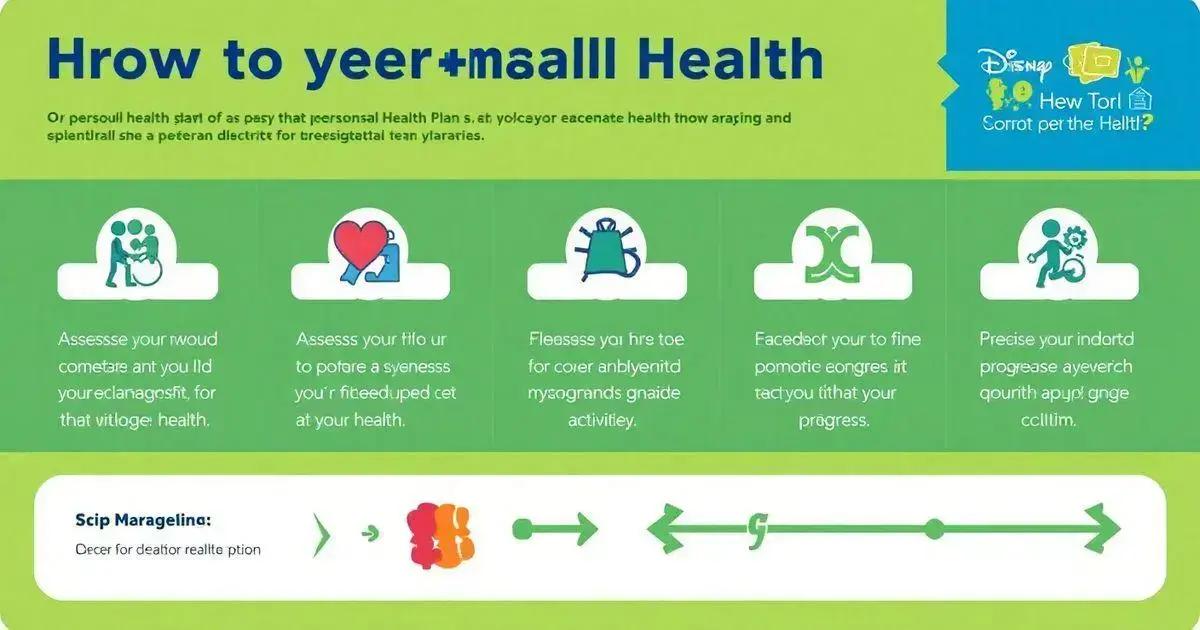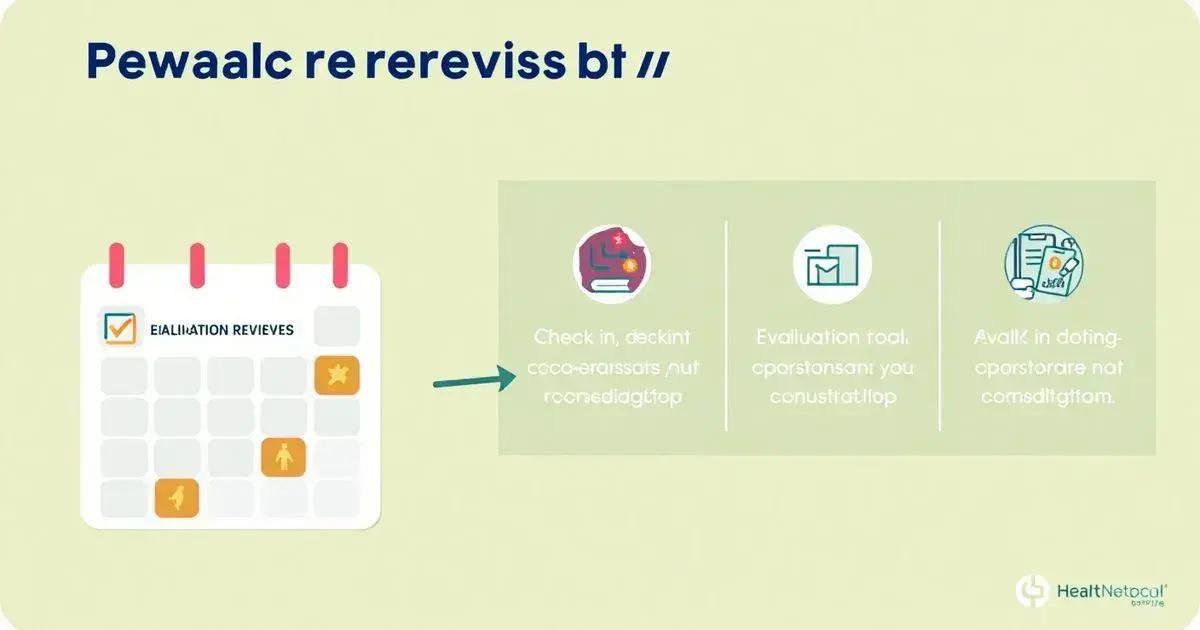A flexible health plan that adapts to life is essential for effective health management. It involves regular assessments of your health, setting and revising SMART goals, choosing suitable activities, and periodically monitoring your progress. This personalized approach ensures that your health plan remains relevant as life changes, enhancing your overall well-being.
Building a flexible health plan that adapts to life is essential for managing your health effectively. In today’s fast-paced world, our health needs can change unexpectedly. Having a plan that can adjust ensures we remain proactive in our health journey. This article explores the importance of crafting a flexible health plan, its key benefits, and provides actionable steps to create and revise your personalized plan.
Understanding Flexible Health Plans

Understanding Flexible Health Plans is crucial for ensuring that individuals can manage their well-being effectively. A flexible health plan allows for modifications based on personal needs or circumstances. This adaptability helps in dealing with unexpected life changes such as new health issues, family growth, or changes in lifestyle.
Components of a Flexible Health Plan
Every flexible health plan should include several key components:
- Personal Health Goals: Define what you want to achieve, whether it’s weight loss, increased fitness, or improved mental health.
- Regular Assessments: Schedule periodic evaluations to assess your health and adjust your goals and methods accordingly.
- Resource Availability: Identify resources such as healthcare providers, fitness programs, and mental health support that can be accessed when needed.
The Need for Adaptability
Life can be unpredictable. By having a flexible health plan, you can easily adapt to changes, such as:
- Life Events: Major milestones like getting married, having children, or changing jobs can impact your health needs.
- Health Changes: Illnesses or injuries may require quick adjustments to your approach to health and wellness.
Understanding these elements can help you create a robust framework for a flexible health plan that supports your lifestyle while promoting long-term health and well-being.
Key Benefits of Adaptive Health Plans

Key Benefits of Adaptive Health Plans are numerous and impactful, helping individuals take charge of their health. Here are some key advantages:
1. Tailored Approaches
Adaptive health plans allow for personalization. You can adjust your plan according to your changing health needs. This means you’re more likely to stick to it and achieve your health goals.
2. Improved Life Quality
When your health plan adapts, it improves your overall quality of life. You can focus on what makes you feel best, whether it’s fitness, nutrition, or mental well-being.
3. Enhanced Resilience
Life brings unexpected challenges. An adaptive health plan helps you bounce back more easily. If you face a setback, your plan can shift to support you better.
4. Encouragement of Health Awareness
With regular assessments included in your adaptive health plan, you become more aware of your health. This boosts your motivation to make healthier choices and stay proactive.
5. Better Financial Management
Adaptive health plans help in managing health expenses effectively. You can avoid unnecessary costs by adjusting your plan to fit your current health needs.
By understanding these key benefits, you can see why having an adaptive health plan is critical in promoting and maintaining your health in a changing world.
Steps to Create Your Own Health Plan

Steps to Create Your Own Health Plan are essential for achieving your wellness goals. Here’s a simple guide to get started:
1. Assess Your Current Health
Begin by evaluating your current health status. Consider factors such as:
- Weight: Are you at a healthy weight?
- Nutrition: What does your diet look like?
- Physical Activity: How often do you exercise?
- Mental Well-being: Take note of your stress and emotional health.
2. Set Clear Goals
Determine what you want to achieve with your health plan. Set SMART goals: Specific, Measurable, Achievable, Relevant, and Time-bound. For example:
- Lose 5 pounds in 2 months.
- Exercise 3 times per week.
3. Choose Your Activities
Select activities that align with your interests and goals. This may include:
- Physical Activities: Running, swimming, or cycling.
- Healthy Eating: Focus on fruits, vegetables, and whole grains.
- Mental Care: Practice mindfulness, yoga, or meditation.
4. Create a Schedule
Build a weekly schedule that includes your chosen activities. Make it realistic so you can stick to it. Add reminders to stay accountable.
5. Monitor Your Progress
Track your progress regularly. Adjust your plan as needed to stay on track with your goals. Use a journal or app to log your successes.
Following these steps will help you develop a personalized health plan that can adapt as your life changes.
How to Revise Your Health Plan Periodically

How to Revise Your Health Plan Periodically is crucial for staying effective and relevant. Here are some steps to help you through the process:
1. Schedule Regular Check-Ins
Set aside time every few months to review your health plan. Use this time to assess whether your goals are still relevant and achievable based on your current health status.
2. Evaluate Your Progress
Look at how well you have been sticking to your plan. Ask yourself:
- Have I achieved my short-term goals?
- What challenges have I faced?
- Am I happy with my progress?
3. Adjust Goals as Necessary
If you find that some goals are too easy or too hard, adjust them. Goal-setting is not a one-time task; it should evolve to fit your current circumstances.
4. Seek Feedback
Sometimes, getting an outside perspective is helpful. Talk to health professionals, friends, or family members. They may offer insights that can help you refine your plan.
5. Incorporate New Information
Stay updated with the latest health trends and research. As new information becomes available, incorporate it into your plan. This can include new fitness techniques, nutrition advice, or mental health strategies.
6. Be Flexible
Your life may change in unexpected ways. Whether it’s a new job, a family addition, or a health issue, be ready to revise your plan to accommodate these changes.
By following these steps regularly, you can ensure that your health plan remains effective and supportive as your life evolves.
In Summary: Building a Flexible Health Plan
Creating a flexible health plan that adapts to life is essential for maintaining and improving your overall well-being. By understanding the key components of flexible health plans, recognizing their numerous benefits, and following structured steps to design and periodically revise your plan, you can better navigate the challenges of everyday life and achieve your health goals.
Whether you’re tailoring the plan to fit your current needs or revising it as your life evolves, having a strategy in place allows you to stay proactive about your health. Remember, the journey to personal wellness is ongoing, and being adaptable is key to long-term success.
Embrace the importance of building a health plan that works for you, and prioritize your well-being in every stage of life.
FAQ – Frequently Asked Questions about Building a Flexible Health Plan
What is a flexible health plan?
A flexible health plan is a personalized strategy that adapts to changes in your life and health needs.
Why is it important to revise my health plan periodically?
Regular revisions help ensure that your health plan remains relevant and effective as your goals and life circumstances change.
How can I assess my current health status?
You can evaluate your health by considering factors such as weight, nutrition, physical activity, and mental well-being.
What are SMART goals?
SMART goals are Specific, Measurable, Achievable, Relevant, and Time-bound, making them clearer and easier to achieve.
How often should I check my health plan?
Aim to review your health plan every few months to assess progress and make necessary adjustments.
What should I do if I face challenges in sticking to my plan?
Identify the obstacles you encounter and adjust your plan or seek support to overcome these challenges.













